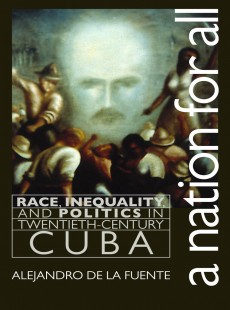
A Nation for All
Race, Inequality, and Politics in Twentieth-Century Cuba
Alejandro de la Fuente
 Publisher: University of North Carolina Press
Publisher: University of North Carolina Press
Imprint: The University of North Carolina Press
Published: 01/2011
Pages: 464
Subject: History, Social Science
| University of North Carolina
Print ISBN: 9.78E+12
eBook ISBN: 9780807898765
DESCRIPTION
Tracing the formation and reformulation of nationalist ideologies, government policies, and different forms of social and political mobilization in republican and postrevolutionary Cuba, Alejandro de la Fuente explores the opportunities and limitations that Afro-Cubans experienced in such areas as job access, education, and political representation. Challenging assumptions of both underlying racism and racial democracy, he contends that racism and antiracism coexisted within Cuban nationalism and, in turn, Cuban society. This coexistence has persisted to this day, despite significant efforts by the revolutionary government to improve the lot of the poor and build a nation that was truly for all.
RELATED TITLES





